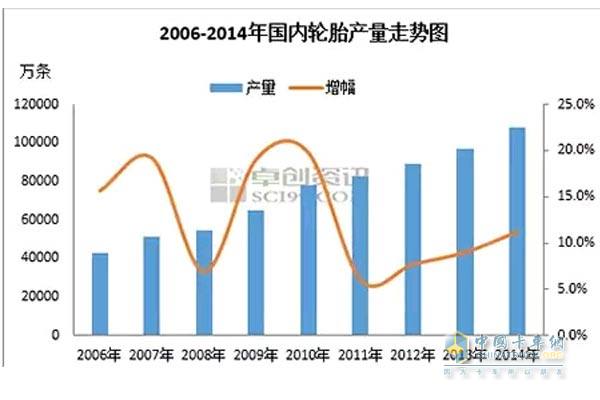The development of the tire industry has entered different tracks in the past few years with an acceleration. Just after the Spring Festival, there was a rumored ruin of a tire company in Shandong. Less than a month later, there was news that the world’s fifth-largest tire manufacturer was acquired by China National Chemicals. The tire industry has changed. From large-scale restructuring to small-scale business operations, when we look at the current development status of the tire industry, what are we discovering? What are the problems behind the new findings that warrant our consideration? This article focuses on the development of the industry and increases production. Rapidly slowing, repeated trade barriers, and industry profit compression are four aspects to clarify that the tires have entered the "new normal" era. 
2006-2014 Domestic Tire Production Chart
In recent years, the recovery of the world economy has slowed down, the domestic economic growth rate has declined, the production and sales of automobiles have returned to rationality, the growth rate of road freight transportation has dropped, and the export market has been in short supply. China's tire industry has bid farewell to the high growth era, showing a new trend of low-to-moderate growth. This is one of the "new normals" for the current development of the tire industry. As shown in the figure, since 2010, the growth rate of China's tire industry has continued to decline from 19.7% in 2010 to 11.2% in 2014.
Under the current situation, China's tire industry faces many problems, such as low competitive advantage of independent brands, serious homogeneity of products, fierce price wars at home and abroad, vulnerability to barriers to trade protection, and continuous shrinking profits. In the case of fluctuations in the “weak recovery†of the economy and the weak market demand, the main recommendations are as follows:
1. Promote brand building and enhance market competitiveness. China is the world's largest tire producer and exporter, but its popularity is not commensurate with this. In the fierce international market competition, independent brands are becoming more and more important. With our own brands, we no longer just give foreign-owned companies the right to make a living through micro-processing fees. With our own brands, we can not only develop. The international market can also stimulate domestic demand.
2. Increase technological innovation and increase product added value. The US anti-survey investigation has come to an end, and the eventual levying of high tariffs is a matter of fact. At the same time, the second phase of the EU Green Tire Labeling Law is about to be implemented, which will be a major test for Chinese tire companies. Only by breaking down the technical barriers to products, speeding up the upgrading of independent technologies, developing environmentally-friendly and energy-saving tires, and promoting the industrialization of green tires to meet and meet the needs of domestic and foreign markets. At the same time improve product quality, improve product cost, promote product structure adjustment, from the low-end development to the high-end.
3. Implement mergers and reorganizations to increase industrial concentration. At present, China is the world's largest country, but the number of enterprises is small, scattered, and the organizational structure is irrational and the degree of industrial concentration is low. Mergers and reorganizations are important ways for companies to become bigger and stronger and to accelerate industrial concentration. Among them, Saiwon shares have merged and reorganized Jinyu Industrial, Shenyang Peace, and Shuangqin Group in Xinjiang Kunlun, opening the industry integration of Chinese tires.
Aluminum Cans Baler Machinery is a machine suitable for baling and packing various aluminum cans. It is idea equipment for recycling various metal cans. Being ideal for pressing kinds of cans, includes ubc, aluminum cans, tin cans, steel cans etc. With strong power, have high throughput. With Siemens Motor, Schneider electric system, Germany Dillinger Wearing plate. Machines are built to last. The cans baler Press Machine press kinds of cans, includes ubcs, aluminum cans, tin cans etc. Baling loose cans into high density bales, to save storage and delivery space.
Ring-Pull Can Baler, Zip-Top Can Baler, Aluminum Can Baler, Cans Baling Machine, Cans Baler Machine
Jiangyin Metallurgy Hydraulic Machinery Factory , https://www.eco-metalsrecycling.com